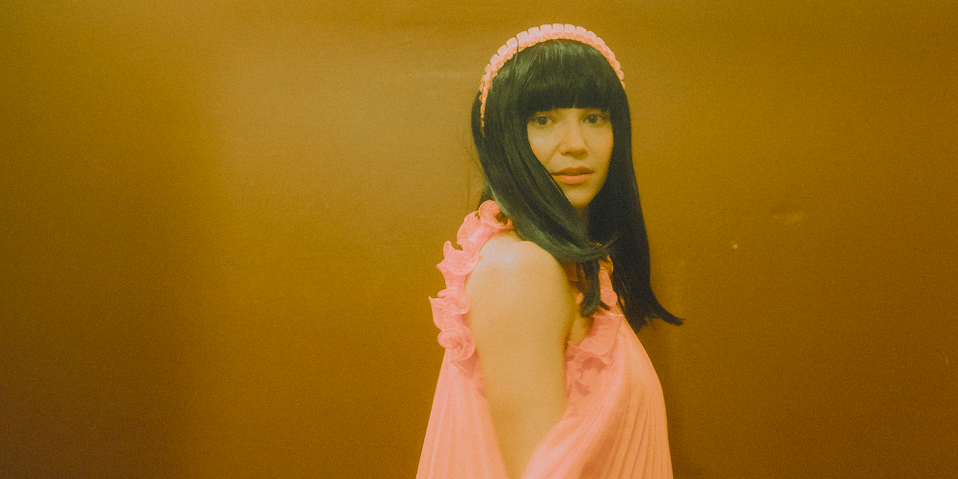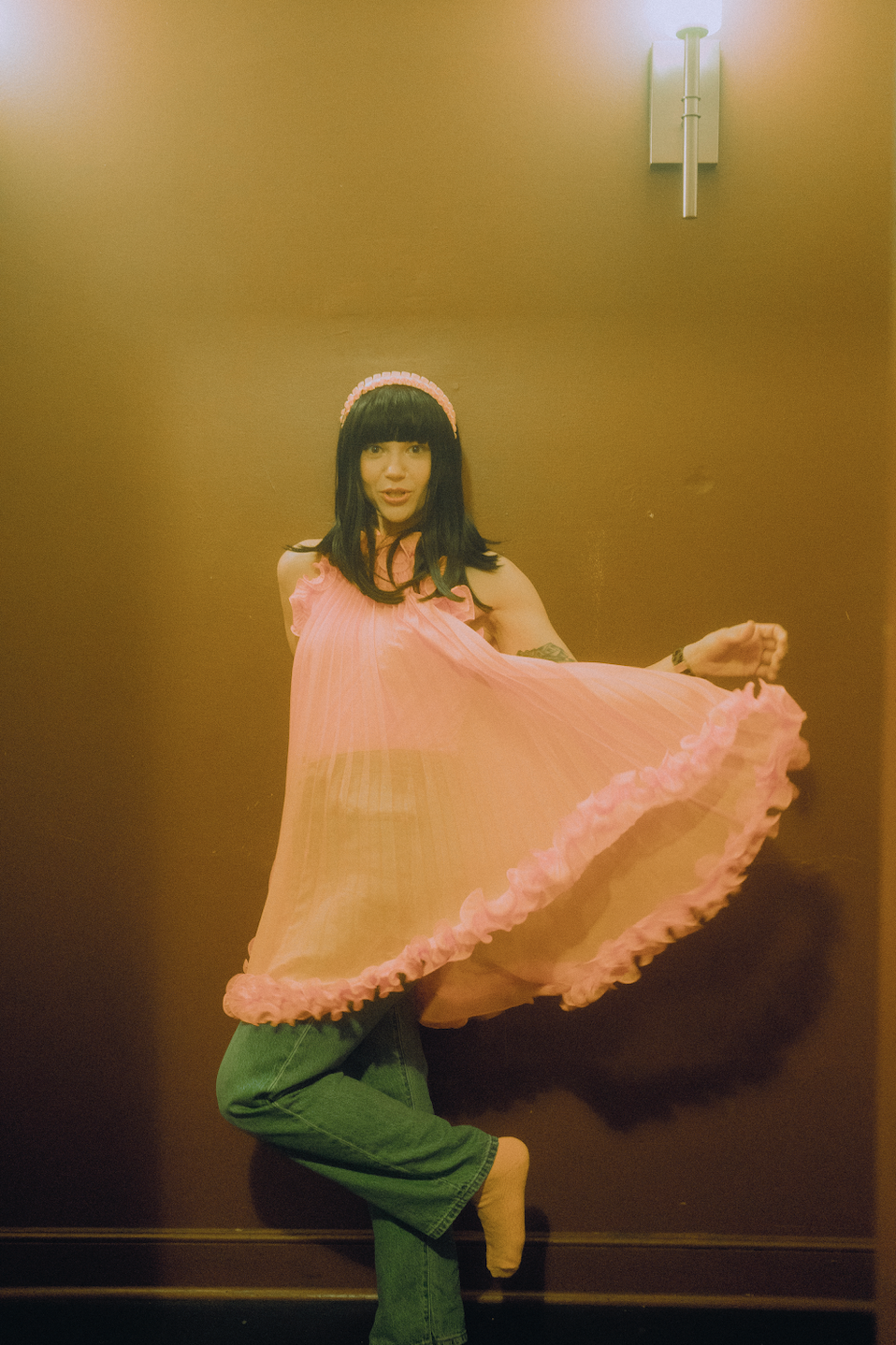Press play on any Khruangbin song and you’ll be slowly transported to an instrumental utopia. Depending on the track, you might find yourself relishing in West African funk, Middle Eastern blues, or Southeast Asian instrumentation. Some surf rock and R&B are sure to be in the mix, too. You might even live out your ultimate cowgirl fantasies with their Southern zydeco-infused offerings. So it makes sense, then, that the band’s name (pronounced “krung-bin”) is the Thai word for “airplane.”
Since their debut album, 2015’s The Universe Smiles Upon You, the Houston-founded band (made up of bassist Laura Lee, guitarist Mark Speer, and drummer Donald “DJ” Johnson) has continued to create a hodgepodge of global subgenres with their music. Their second album, Con Todo El Mundo, stopped off in Iran and Mexico to deliver a smooth, yet vibrant sound. But the last, Mordechai, was a departure from their typical serene vibe (to some of their fan’s chagrin) and opted for more vocals and upbeat melodies.
Their new album A La Sala, out now, shows a return to form. “We wanted to get back to a simpler and more heartfelt place,” Lee tells ELLE.com. “I don’t want to say that we were lost by any means, but I think we needed to remind ourselves where we came from and why we started the band to begin with.” Fans will be pleased to know that the new music calls back to much of their earlier work; it’s intimate, ethereal, and airy—qualities that they’ve now become synonymous with.
The songs are sure to be a hit on the road this summer, as Khruangbin will be touring throughout America and Europe. And they’ll be joined by a wide array of other artists who are also making their own idiosyncratic and unique music: Hermanos Gutiérrez, John Carroll Kirby, Peter Cat Recording Co., Men I Trust, and Arooj Aftab.
Below, Lee discusses what she’s most looking forward to on tour, her favorite memory from recording the new album, and how she’s evolved since the band’s debut.
Can you tell me about the inspiration behind the album’s title A La Sala, which translates to “To the Room” in Spanish?
We felt like what we ended up making was an album that was really intimate and personal between the three of us. We’re like a family and “a la sala” was something that I used to say to my own family when I was three or four years old to get everybody to go to the living room and be together. I would just run around the house and scream it. So this felt like that sentiment. All three of us live in different parts of the United States and it was like saying to them, “Go to the living room now.”
The music on this project calls back to much of your earlier work. Why was the intention to treat this particular album like a homecoming of sorts?
This doesn’t have to apply to a band, but I think sometimes you’re pulled to things because of various influences around you and you want to do all of those things that you’re pulled to. So for us, we got pulled through the industry to do various things throughout our career. We wanted to go back to making music for ourselves and not worry about how other people would receive it. When we started, we didn’t think we would have a band as our career. It was just for fun. The intention behind writing is so different when you’re not writing with pressure or thinking about how the music translates to a festival or any other [external] factor.
With that in mind, why did you choose “A Love International” as the first single?
It was important to let our fans know that we were still an instrumental band at heart. Our last album had a lot of vocals on it and all the singles had a lot of vocals on it and while it’s something we’re still exploring, I think some people missed that original instrumental piece. “A Love International” is a powerful song without words. It was important to lead with that.
Was that the first song you recorded?
No, actually, the very last song on the album, “Les Petits Gris” was the first. That one is so special and tender. When that song was recorded and we knew it was going to go on the album, it meant that the rest of the album needed to be able to be with that song. We think of an album as a complete body of work and that song wouldn’t have fit with our last album by any means. So this was almost like a thesis statement that dictated what the rest of the album needed to feel like.
Is there a song on the album that you’re most proud of?
I’m most proud of “Pon Pón,” not because it necessarily challenged me, but because it almost got thrown out multiple times because it just hadn’t quite gotten to a place where it was feeling good. It was a track that really came together at the end. We made some minor adjustments with the feel and then added these really fun vocals and now it feels integral.
How do you know when a song has gotten to that “good place?”
I think you just know. You have to trust how you feel and if it feels right, then it’s time. We have this rule in the band that if it’s not a yes, it’s a no. If anybody has a question mark face, then it’s not quite there yet.
Do you have a favorite memory of recording the album that sticks out to you the most?
Yeah, I do. The album writing process can be really intense because it’s so creative and it’s so heady. It’s not only your own anxieties that you’re dealing with, but you’re also dealing with everyone else’s. It can be this sort of stressful place sometimes, but there are these magic moments that happen that remind you of why the process is so important. At the very end of “Todavía Viva,” which is the sixth track, there are all these false stops. That happened organically. We were all playing and stopped and we knew it was a stop and then we looked at each other and all went back in again and kept doing it and kept doing it. It was this joyous musical moment and we were all giggling. That was my favorite part of the writing process. It was so wholesome.
How do you think you’ve evolved as an artist since the band’s debut album?
In terms of making music, I can see this path in my creative process that sort of mimics a human life. There’s this simplicity when you start and you’re in your teenage years and you feel the need to impress and fit in and then you reach this place where you’re like, “Actually, I’m not worried about impressing anybody.” That’s where I am now. I’m feeling a little bit more confident about who I am as a player and I can hear it, especially when I’m playing the songs from the last record. I was definitely trying to be more complicated than I am naturally.
The band is getting ready to go on tour and you haven’t played in over a year. How are you feeling?
Now, I’m feeling more at ease. We started rehearsals a few weeks ago and I think the anxiety comes from the anticipation. I hadn’t played with Mark and DJ since we made the album and while I can practice to tracks every day, it’s nerve-wracking not knowing how it’s actually gonna feel when you play it together. And now that we’ve been in a room playing, it’s like, “Oh, no, we’re good.” We started this band and we are who we are because it comes together in this way.
Now that you’re a mother, have your feelings about being on the road changed at all?
It’s changed literally everything. Not just packing for her and, and figuring out how the logistics of that will work, but also wanting to spend more time with her and less time doing some things that were very time-consuming on the road. Like, I had a costume change every night and it meant that I had to have two fittings and there was so much stress about making sure that all of that was right. I haven’t decided how I want to approach that yet. We’ll see how it goes. Maybe it’s just about doing something more pared down. But there are certain places that I’m gonna pull back because my priorities have changed.
Is there a song from the album that you’re most excited to play?
Good question. I guess “May Ninth.” Mark wrote it about 20 years ago and it’s been a song that has been brought up during every album process and never found its home until this record. It feels really special, so I’m excited to see how it translates.
This interview has been edited and condensed for clarity.


